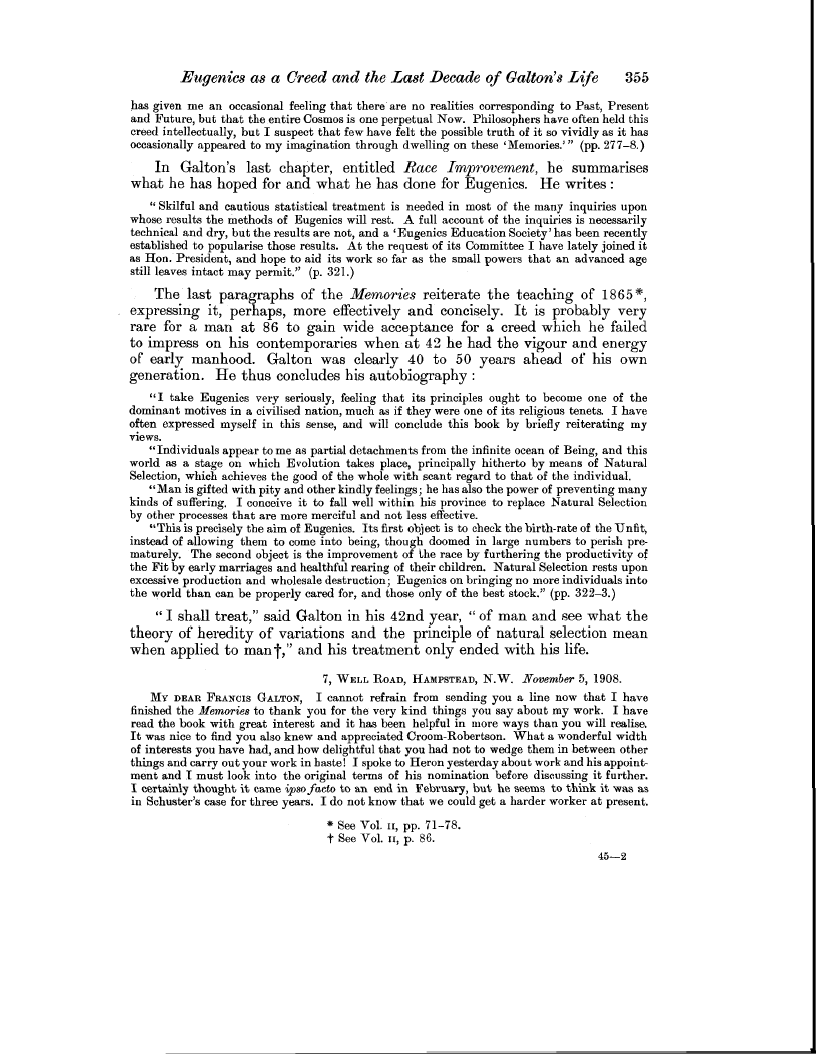| ||||||

OCR Rendition - approximate
Eugenics as a Creed and the Last Decade of Galton's Life 355 has given me an occasional feeling that there are no realities corresponding to Past, Present and Future, but that the entire Cosmos is one perpetual Now. Philosophers have often held this creed intellectually, but I suspect that few have felt the possible truth of it so vividly as it has occasionally appeared to my imagination through dwelling on these `Memories.' " (pp. 277-8.) In Galton's last chapter, entitled Race Improvement, he summarises what he has hoped for and what he has done for Eugenics. He writes " Skilful and cautious statistical treatment is needed in most of the many inquiries upon whose results the methods of Eugenics will rest. A full account of the inquiries is necessarily technical and dry, but the results are not, and a `Eugenics Education Society' has been recently established to popularise those results. At the request of its Committee I have lately joined it as Hon. President, and hope to aid its work so far as the small powers that an advanced age still leaves intact may permit." (p. 321.) The last paragraphs of the Memories reiterate the teaching of 1865*, expressing it, perhaps, more effectively and concisely. It is probably very rare for a man at 86 to gain wide acceptance for a creed which he failed to impress on his contemporaries when at 42 he had the vigour and energy or early manhood. Galton was clearly 40 to 50 years ahead of his own generation. He thus concludes his autobiography "I take Eugenics very seriously, feeling that its principles ought to become one of the dominant motives in a civilised nation, much as if they were one of its religious tenets. I have often expressed myself in this sense, and will conclude this book by briefly reiterating my views. "Individuals appear to me as partial detachments from the infinite ocean of Being, and this world as a stage on which Evolution takes place, principally hitherto by means of Natural Selection, which achieves the good of the whole with scant regard to that of the individual. "Man is gifted with pity and other kindly feelings; he has also the power of preventing many kinds of suffering. I conceive it to fall well within his province to replace Natural Selection by other processes that are more merciful and not less effective. "This is precisely the aim of Eugenics. Its first object is to check the birth-rate of the Unfit, instead of allowing them to come into being, though doomed in large numbers to perish prematurely. The second object is the improvement of the race by furthering the productivity of the Fit by early marriages and healthful rearing of their children. Natural Selection rests upon excessive production and wholesale destruction; Eugenics on bringing no more individuals into the world than can be properly cared for, and those only of the best stock." (pp. 322-3.) " I shall treat," said Galton in his 42nd year, " of man and see what the theory of heredity of variations and the principle of natural selection mean when applied to man t," and his treatment only ended with his life. 7, WELL ROAD, HAMPSTEAD, N.W. November 5, 1908. MY DEAR FRANCIS GALTON, I cannot refrain from sending you a line now that I have finished the Memories to thank you for the very kind things you say about my work. I have read the book with great interest and it has been helpful in more ways than you will realise. It was nice to find you also knew and appreciated Croom-Robertson. What a wonderful width of interests you have had, and how delightful that you had not to wedge them in between other things and carry out your work in baste! I spoke to Heron yesterday about work and his appointment and I must look into the original terms of his nomination before discussing it further. I certainly thought it came ipso facto to an end in February, but he seems to think it was as in Schuster's case for three years. I do not know that we could get a harder worker at present. * See Vol. II, pp. 71-78. t See Vol. u, p. 86. 45-2
|